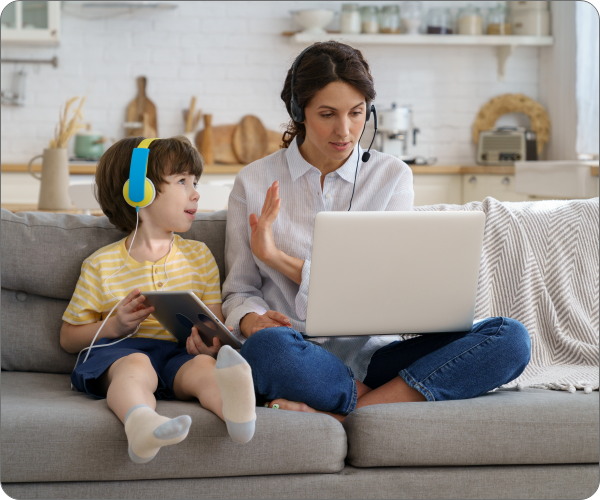REMOTE WORK
7 Ways to Conquer Work From Home Guilt

Home office – formerly a coveted benefit, now a common reality. Despite initial struggles, many companies that switched to home office when the Covid19 pandemic came about were convinced it was a very efficient way of operating and wanted to maintain home office - in some shape or the other - even in the future. You could say that it’s an ideal state – both for people and companies. Yet, as time progressed, businesses started to see the first impacts of telework with all its pros & cons, elaborating on the ideal long-term remote, or hybrid, operating models, not only from the business but also from the employee perspective.
Working from home can trigger various feelings, but one a lot of people encounter is that of guilt. An unjustified feeling of guilt. Different studies and surveys show different numbers. If we average them, it turns out that half of the people at home office have come across this struggle.
Where did you come from?
In addition to the fact that we ourselves have a great influence on whether we struggle with guilt while working from home, there are also external causes.
The first is history. Before the advent of Covid19, home office was mostly considered a benefit, a privilege, and therefore certain relief. As a result, this mistakenly gave rise to the idea that work at home office is better, easier, simpler, and less strenuous.
The second reason is the paradox regarding home office performance. While most companies and employees have found that working in home office mode leads to higher productivity, most line managers are concerned that their home office performance will decline. They feel that they can’t manage what they can’t see.
Before the advent of Covid19, home office was mostly considered a benefit, a privilege, and therefore certain relief.
What are people at home office ashamed of or guilty about?
Others definitely think I work less.
Probably what is most widespread is the unpleasant feeling in the back of the mind that others (colleagues, the manager, or possibly ourselves) feel that we work less than people in the office. Since we don’t waste time moving about, we have a quick lunch, we have no one to talk to on break, no one distracts us from concentrating on questions or talking loudly near our desk, it happens that we finish a task we would complete in the office right at the end of working hours much earlier. Can I finish this early if I have everything I’ve planned done? That won’t work; they might think I’m abusing my home office. I’ll do something else I originally planned to do tomorrow.
I can’t rest, that way it doesn’t look like I’m being lazy.
The employer (colleagues, superior) needs us to be available at a certain time. During that time, can I take a break, stretch, make coffee? Am I violating trust by doing that? While at the office we usually get up from our chairs, move around the workplace, talk in the kitchen, and no one is surprised that we take a short break. At home we feel guilty every time we get up from the chair. We get the feeling that we don’t deserve the freedom of home office or that someone will definitely catch us.

I have to get a lot done so it’s visible how hardworking I am
As a result, we may have an inflated need to show what we’ve done and how productive we were, perhaps proving our productivity by the number of processed emails and urgent tasks we’ve handled, nevertheless the result is rather small and less important tasks.
Working from home is not as imperative as working in the office
Bad feelings don’t happen to us only in terms of productivity and use of time. Some people get gloomy from having spent the day in pajamas or sweatpants. They feel that compared to their colleagues in the office, they are a secondary workforce, that they and their work do not have as much weight and importance as their colleagues and their work in the office. Internally, they struggle with whether to dress up as though “in the office”, and when practicality and comfort prevail, they blame themselves.
I’m not doing anything properly, just half the job.
Working at home office often also leads to work being distributed as conditions at home allow and times when we are most efficient. We often handle emails in the early morning hours, as well as at night. In the meantime, we manage to take the kids to their activities, walk the dog, and do the shopping. For some, a perfect work-life balance, for others, constant doubts and feelings that I’m not doing anything properly – I neither rest nor work.
In the evening, our smart watch informs us that despite the overall fatigue and exhaustion, we’ve taken barely half the recommended steps per day. Add to this the erroneous (real or perceived) expectations of the family and those in the immediate surroundings. How is it that I’ve been home all day, yet there are dirty dishes everywhere and it’s untidy? And instead of studying with the kids, I just briefly check their bags to see if they’re ready for the next day of school?
So, on top of everything else, we have feelings that we are failing in our family roles. While we don’t dare postpone work, we postpone the household and related tasks for more and more days.
What to do about it?
1. Maintain performance - this doesn’t mean you can do twice as much work at home office as in the office, but you do the tasks that you would solve within the office on that given day at home. If you get everything you need to done, then you don’t have to worry about others thinking you work less. The key is to be clear about your tasks and priorities. If you are unsure, actively verify them and map the assignments and expectations of your superiors and colleagues.
2. Monitor your self-discipline - many pitfalls are waiting for you at home and it’s easier to procrastinate than in the office, where we don’t allow ourselves to so much because we are in sight. Try to make a daily plan where you can incorporate non-work activities. In this way, you’ll have more control over them. And set partial goals and milestones for your work, including small rewards (for example, when I do this, I’ll have coffee on the terrace and browse Instagram).
3. Keep a simple and clear system for recording your tasks and results - the moment you can clearly see a list of everything you’ve managed on a given day, you’ll get a good feeling and thus alleviate the fear that you have to prove that you don’t waste time at home office. Having such a list also protects you from unproductive activities like handling dozens of unessential emails, although they are visible.
4. When you’ve done everything you planned, it is entirely up to you whether you do extra work or engage in other non-work activities. If you decide to continue working, make sure that in the weekly overview, the volume of work corresponds to the work you would do in the office. Avoid systematic long-term overloading at the expense of your personal life.

7. Take breaks whenever you need to. Listen to your body and don’t forget to feed and rest it. You also take short breaks in the office. It’s not about lounging around, but about restoring concentration and energy. Breaks are needed to give you really good performance and get work done. With a short break and energy replenishment, you can handle the upcoming tasks much quicker and easier than sitting in front of the screen.
8. Don’t think about what others think of your work. If it’s important to you, ask for feedback. But don’t worry about what someone might think of you. Even if it were true, you are not responsible for the thoughts and assumptions of others and you don’t have to feel guilty about them. If you stick to the above points, there is no reason to be ashamed that you work from home.
.png)